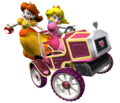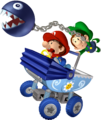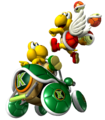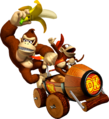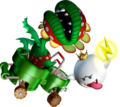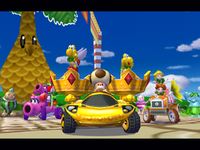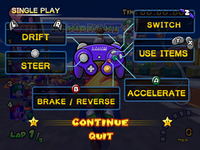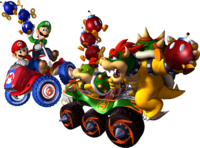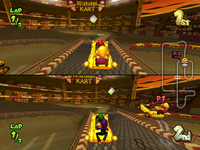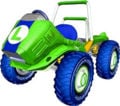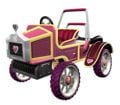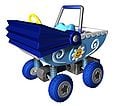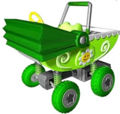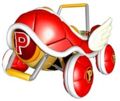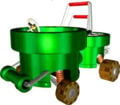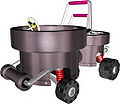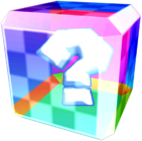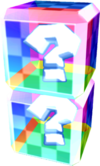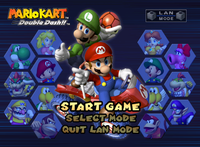Mario Kart: Double Dash!!
Template:Infobox Mario Kart: Double Dash!! is a racing game developed and published by Nintendo for the GameCube and the fourth installment of the Mario Kart series. The game was released in November 2003 worldwide, being released in Japan first. The game, while retaining many aspects of previous Mario Kart games, such as selecting a Mario franchise character as the player's driver and the familiar item-based weaponry that the series employs, introduces a feature that is unique to this entry in the Mario Kart series: the two-person karts, hence the title of the game. Two characters handle a single kart, where one character steers and the other deals with items, and they can switch positions if necessary. The game is the only game in the franchise where two players can play cooperatively in one kart, with each player handling a single character, though the option to play in separate 2-person karts for each player is still available. In addition, the game introduces Special Items, items that are exclusive to a pair of characters, which is another feature unique to this game. The game is one of the few games to take advantage of LAN Mode via the Nintendo GameCube Broadband Adapter, which allows up to sixteen players to participate in a single game.
Mario Kart: Double Dash!! is the first Mario Kart game in the series to employ 3D graphics for characters and items, as opposed to Mario Kart 64 using pre-rendered sprites to display these objects. The game's character models are then to be reused and enhanced in Mario Kart Wii. The game also introduces a larger variety of karts to select from depending on the character combo's weight class rather than the standard go-kart being the sole vehicle all racers use, and this variety of vehicles is retained in all Mario Kart games since.
New features
As with every new Mario Kart game, Mario Kart: Double Dash!! shows several new features, granting a new style of playing for the users. Apart from that, there are two characters per kart; the number of playable characters was increased to join the race. As implied in various Mario series games, Mario Kart: Double Dash!! contains many elements to unlock as well. By beating the cups available in every engine level, the player unveils other hidden levels, karts, and other playable characters in the game. Furthermore, there is a very dynamic selection of karts: Every kart has specific stats that distinguishes from the others, as well as capturing their respective character's style; for instance, Mario's kart, the Red Fire. In the first three games, there was only one kart that the players could use, which was what Mario Kart 7 would eventually call the Pipe Frame.
Items are the main element presented in every Mario Kart game, and Mario Kart: Double Dash!! is no exception. These are obtainable via Item Boxes, where characters can receive any standard Item or a Special Item. The latter is an item that a specific pair of characters can receive, while all others cannot. Additionally, power-ups dropped on the course will instantly effect the kart that would pick on it as a Banana, a Koopa Shell or a Mushroom or Star. The effects of certain items have changed considerably as well.
Another notable change featured in the game is the point system given to the racers after a competition in Grand Prix mode. Starting from Mario Kart: Double Dash!! onward, this new system is used for the newer Mario Kart installments that were developed after this one. Also, players cannot retry a failed race in Grand Prix mode, as opposed to the first three games. Users have to continue racing until finishing a cup to see the overall results. The following chart shows the difference of the point spreads from previous games to Mario Kart: Double Dash!!.
| Point Spread Comparisons | ||||||||
|---|---|---|---|---|---|---|---|---|
| 1st | 2nd | 3rd | 4th | 5th | 6th | 7th | 8th | |
| SMK + MK64 + MKSC | 9 | 6 | 3 | 1 | 0 | 0 | 0 | 0 |
| MKDD | 10 | 8 | 6 | 4 | 3 | 2 | 1 | 0 |
This is also the first Mario Kart game to feature live-rendered 3D models for the characters and items, whereas in previous Mario Kart games, the characters and items are pre-rendered sprites.
However, more than the new point system, Double Dash!! also added important features that would become mainstays of the future Mario Kart titles, starting with Double Dash!!. For example, before the start of every race, a short overview of the track, lasting a few seconds, shows all of the big features of the track, such as obstacles, scenery, and other things. Also, the timer to start the race lasts for one second longer; in Double Dash!!, the timer is "3, 2, 1, START!", while in the first three games, the timer was "2, 1, GO!".
Characters
Because of the team mechanic, Mario Kart: Double Dash!! includes a wide number of playable characters, all of which have appeared in previous Mario games, with the exception of Toadette, who makes her first appearance in this game. The game features eleven newcomers, the second most introduced in any Mario Kart game. Characters are divided into three classes depending on their weight: Light, Medium, and Heavy. There are eight default teams and two unlockable teams, a total of ten teams and twenty individual characters which can be combined in any way, giving 190 possible character combinations. Pressing ![]() and
and ![]() together before selecting any character will choose a random pair of characters and a random kart to play as. In multiplayer mode, it'll randomize everyone's character and kart.
together before selecting any character will choose a random pair of characters and a random kart to play as. In multiplayer mode, it'll randomize everyone's character and kart.
Drivers
Starting teams
- Normal yoshibirdo.png
Unlockable teams
* - indicates a new character to the Mario Kart series.
** - Mario Kart: Double Dash!! is Toadette's first appearance in the overall Mario franchise.
Unlocking criteria
| Unlock Criteria | |
|---|---|
| Toad and Toadette | Win the 100cc Special Cup. |
| Petey Piranha and King Boo | Win the Mirror Star Cup. |
Supporting characters
In addition to the playable drivers, numerous other Mario series characters play supporting roles in the game as well. Lakitu reprises his role as the referee, meaning that he signals the start of each and every race and battle with his starting lights, alerts players when they complete a lap around the course, tells the drivers when they're going in the wrong direction, waves the checkered flag to finish the race at the finish line, and returns drivers to the track if they land themselves in a dangerous predicament (i.e. falling off the course). Other characters who make cameos include Shy Guys, Piranha Plants, Cataquacks, and Dinosaurs. Toadsworth drives the winners of a cup around Peach Beach in the Parade Kart. Piantas and Nokis from Super Mario Sunshine cheer the racers on in some courses and join them during the Award Ceremony.
Controls
Mario Kart: Double Dash!! has various controls for racing and menus. Each button on the controller represents a different ability while the player is racing or battling.
Menu controls
 - Move
- Move - Accept option/Save Game (At the Options Screen)
- Accept option/Save Game (At the Options Screen) - Go back
- Go back +
+ - Random selection (At the character select screen)
- Random selection (At the character select screen) - Open Start Menu (at title screen)
- Open Start Menu (at title screen)
Race controls
Single play
 - Accelerate/Rocket Start
- Accelerate/Rocket Start - Brake/Reverse
- Brake/Reverse - Steer
- Steer /
/ - Drift/Powerslide (Hold)/Mini-Turbo (Release)
- Drift/Powerslide (Hold)/Mini-Turbo (Release) /
/ - Use item/Stop Item Roulette/Sound horn
- Use item/Stop Item Roulette/Sound horn /
/ +
+  - Throw item forward or backward
- Throw item forward or backward - Switch characters
- Switch characters - Pause/Resume
- Pause/Resume
Co-op play
 - Double Dash
- Double Dash /
/ /
/ /
/ - Use item/Stop Item Roulette/Sound horn
- Use item/Stop Item Roulette/Sound horn /
/ - Slide-Attack
- Slide-Attack - Switch characters (both players must hit the switch button at the same time)
- Switch characters (both players must hit the switch button at the same time)
Game modes
Mario Kart: Double Dash!! contains sixteen new racing courses added, along with six new battle courses. Each racecourse contains its own difficulty and gimmicks. Up to four players can play in all the modes, excluding Time Trial mode, where only one is permitted. In addition, the users can play independently or in cooperative mode, a unique style of gameplay only featured in Mario Kart: Double Dash!!.
Grand Prix
In Grand Prix Mode, the player needs to win the cups against computer-controlled opponents. The difficulty level against CPU racers changes in each of the four engine classes, which are the following:
- 50cc - Easy. The minimum top speed is low for all karts and CPU racers have a very limited selection of items. Any kart will take the 1st and 2nd place positions.
- 100cc - Normal. The minimum top speed is fairly average, while CPU drivers have a wider selection of items: they may use Red Shells to shoot it to the player in front of them. Lightweight karts are never in the top positions (when controlled by CPU).
- 150cc - Hard. The minimum top speed in the karts is high, and CPU drivers have a wider selection of Items, most notably, the Spiny Shell's addition. In this level, CPU drivers can take down players using the items against them. Additionally, all characters race in mixed teams. CPU-controlled heavyweight karts usually take the top positions, with middleweight cars very rarely taking the top positions (when controlled by CPU).
- Mirror - Very Hard. Similar to 150cc engine class, however all the tracks are mirrored. CPU-controlled heavyweight karts usually take the top positions, with middleweight cars very rarely taking the top positions (when controlled by CPU).
There are mainly four cups in Grand Prix mode, each one with four stages to race. These cups bear their difficulty levels as well as the race courses within. The most basic is Mushroom Cup with simple courses and few gimmicks. Special Cup, on the other hand, contains long and gimmicky race courses. All the race courses have three laps, except Baby Park, which has seven because of its short length, and Wario Colosseum, which has two due to its great length.
Special Cup is an unlockable cup. It is unlocked when players beat 100cc Star Cup.
A fifth cup, the All-Cup Tour is the conglomeration of all the cups in the game. It is unlocked after players beat the Special Cup in 150cc. The 16 tracks are played through one after another in random order, with the exceptions of Luigi Circuit always appearing first and the Rainbow Road always appearing last. This cup does not appear in other racing modes.
In GP Mode, two players can join a race, as themselves or in Co-op play. Players can play Grand Prix mode with two players in different karts or in co-op mode for two to four players.
Time Trial
In Time Trial, a single player races courses over a set number of laps to record the fastest completion time. Before racing, adding the player's name entry will register their records available. When a race starts, the characters will have two mushrooms in hand for speed boost. The best time elapsed in a lap and a race on a specific track will be saved after completing the race. Once a race is completed on a course, the user is able to compete against either their Ghost from the current Ghost data or the Staff Ghost within the stage. Otherwise, if a race is failed, the Ghost data will not be saved. The Ghost data recording can be disabled in the Options screen menu. Each Ghost save is worth five blocks on the GameCube Memory Card.
In Japan, players were able to submit special codes in Time Trial mode as part of a contest. The content never existed outside of Japan, but the results of the code can still be accessed in all versions of the game.
Battle
Battle Mode is a traditional mode that has presented throughout all Mario Kart games. Two to four players can compete against themselves using a variety of items (including all the special items) on the new battle arenas found in Mario Kart: Double Dash!!.
In Battle mode it is possible to play in three sub-modes:
| Battle | Description |
|---|---|
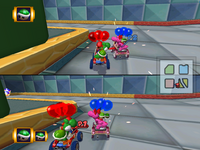 Balloon Battle |
The classic battle style which consists of popping opponents' balloons to score, using the items from the Item Boxes. In Mario Kart: Double Dash!! the players can even "steal" balloons from their rivals, using a Mushroom to dash into them or hitting with a star. This new feature has been kept for future Mario Kart games. In Co-op play, the rear player can also take away opponents' balloons while doing a slide-attack. Unlike Mario Kart 64 and Mario Kart: Super Circuit, the players no longer transform into Mini Bomb Karts or Bob-ombs after being taken out, and instead just vanish. |
Shine Thief |
In Shine Thief, players must retrieve a Shine Sprite dropped on the course and keep it in hand until time runs out. On the other hand, players who couldn't retrieve the treasure can use items against whoever has the Shine to force them to drop it. If using a Mushroom, a Star or a slide-attack (Co-op Play), a Shineless player can steal the Shine directly from its owner. The Battle mode Shine Runners from Mario Kart DS was based on this sub-mode. |
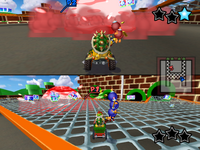 Bob-omb Blast |
Characters use Bob-ombs to hit their opponents and score stars to win. The bombs can be obtained by running over an Item Box, which only contains Bob-ombs. Every character can hold up to five of these explosives, and can throw them forwards or drop them backwards. Any kart that makes contact with an opponent's bomb or gets blown up by the explosion will lose stars. For two players, competitors need three stars to finish the battle, while for three or four players, they need four. |
Names in other languages
- Balloon Battle
| Language | Name | Meaning | Notes |
|---|---|---|---|
| German | Ballon-Wettkampf[?] | Balloon Contest | |
| Italian | Battaglia Palloncini[?] | Balloon Battle |
- Shine Thief
| Language | Name | Meaning | Notes |
|---|---|---|---|
| German | Insignien-Diebstahl[?] | Insignia Theft | |
| Italian | Ruba il Sole Custode[?] | Steal the Shine |
- Bob-omb Blast
| Language | Name | Meaning | Notes |
|---|---|---|---|
| German | Bob-omb-Wurf[?] | Bob-omb Toss | |
| Italian | Scoppio di Bob-ombe[?] | Bob-ombs' Outbreak |
Battle courses
Luigi's Mansion
(unlockable)Tilt-a-Kart
(unlockable)
Unlocking criteria
| Criteria | |
|---|---|
| Luigi's Mansion | Win the 150cc Mushroom Cup. |
| Tilt-a-Kart | Win the Mirror Flower Cup. |
Versus
Versus (for two to four players) allows racers to select their characters and karts, and compete among themselves on the tracks. It's also possible to play in versus mode through a LAN connection where more than four players can join a competition. Additionally, there are some versus options found in the Option menu to change the mode's gameplay:
- Number of Laps: The number of laps set over all tracks, ranging from one to nine. If one lap is chosen, the beginning of the race will start as a Final Lap with Final Lap fanfare music.
- Items: The variety of items given to the racers can be changed to:
- Recommended: Default way in obtaining certain item by racer's place.
- Basic: Powerful items like lightning bolts or stars are rarely obtainable.
- Frantic: Items such as bananas and green shells are absent.
- None: No items to use at all.
Co-op play
Supporting the main feature in Mario Kart: Double Dash!! upon two-racers-one-kart, Cooperative Play (also said Co-op Play) lets two players control their respective character in a kart, one being the driver and the other as the item thrower. While playing in Co-op mode, the players' characters can perform special moves that a single player cannot make. The rear character can perform a slide-attack to steal an item from their rivals while messing up the rival's vehicle's controls. Both players can even double the power of the Rocket Start by pressing the ![]() button at the same time. This special boost is the Double Dash.
button at the same time. This special boost is the Double Dash.
The following table below excludes Time Trial as it is a single player exclusive mode.
| Co-op Play Modes | ||||
|---|---|---|---|---|
| Players | Grand Prix | Versus | Battle | |
| P1 vs. P2 | ||||
| P1 & P2 | ||||
| P1 & P2 vs. P3 | ||||
| P1 & P2 vs. P3 vs. P4 | ||||
| P1 & P2 vs. P3 & P4 | ||||
Karts
| Selecting a kart by characters' size | ||
|---|---|---|
| Weight Pairings | Kart Selected | |
| Light | Light | Light Kart |
| Medium | Light | Medium Kart |
| Medium | Medium | |
| Heavy | Light | Heavy Kart |
| Heavy | Medium | |
| Heavy | Heavy | |
Twenty-one karts are available in Mario Kart: Double Dash!!, notable for having different designs and appearances. There is one kart for each character, plus the Parade Kart. Every kart has three ratings, rated by the number of stars. The maximum amount is five.
- Acceleration: How quickly a kart can achieve its top speed.
- Speed: The level of top speed when the kart goes forward.
- Weight: The weight of the kart.
Just as the characters are classified according to their weights, karts are split into three groups in size with some general characteristics:
- Light: Lightweight karts show a nice acceleration but poor top speed and low weight. They can be easily bumped away by heavier karts. They do not lose a lot of speed when they go off course.
- Medium: Medium-weight vehicles show average top speed and acceleration. Some karts within this group have slightly varied stats, though.
- Heavy: Heavyweight karts have the highest level of weight among the karts, capable of knocking away light and medium-weight vehicles. Many of these show high top speed, although their acceleration and off-road are fairly poor.
Each combination of characters will also determine the class of kart that will be used for the race. The table to the top right means the resulting vehicle according to the size of the characters.
An exception to this rule is the Parade Kart, which all the characters, regardless of weight, can drive. It is unlocked by completing All-Cup Tour in Mirror Mode.
Kart stats
These are the kart stats that are displayed in-game.
Red Fire
Speed: 3
Acceleration: 3
Owner: Mario
Weight: 3
MEDIUMGreen Fire*
Speed: 4
Acceleration: 2
Owner: Luigi
Weight: 2
MEDIUMHeart Coach
Speed: 2
Acceleration: 4
Owner: Princess Peach
Weight: 3
MEDIUM- BloomCoach.jpg
Bloom Coach*
Speed: 3
Acceleration: 3
Owner: Princess Daisy
Weight: 2
MEDIUM Turbo Yoshi
Speed: 2
Acceleration: 4
Owner: Yoshi
Weight: 3
MEDIUM- Turbobirdo.jpg
Turbo Birdo*
Speed: 3
Acceleration: 3
Owner: Birdo
Weight: 4
MEDIUM Goo-Goo Buggy
Speed: 1
Acceleration: 5
Owner: Baby Mario
Weight: 2
LIGHTRattle Buggy*
Speed: 2
Acceleration: 4
Owner: Baby Luigi
Weight: 2
LIGHTToad Kart*
Speed: 2
Acceleration: 4
Owner: Toad
Weight: 2
LIGHTToadette Kart*
Speed: 1
Acceleration: 5
Owner: Toadette
Weight: 2
LIGHTKoopa Dasher
Speed: 2
Acceleration: 4
Owner: Koopa Troopa
Weight: 2
LIGHTPara-Wing*
Speed: 1
Acceleration: 5
Owner: Koopa Paratroopa
Weight: 2
LIGHTDK Jumbo
Speed: 4
Acceleration: 2
Owner: Donkey Kong
Weight: 4
HEAVY- Barreltrain.jpg
Barrel Train*
Speed: 4
Acceleration: 2
Owner: Diddy Kong
Weight: 3
LIGHT Koopa King
Speed: 5
Acceleration: 1
Owner: Bowser
Weight: 5
HEAVY- Bulletblaster2.jpg
Bullet Blaster*
Speed: 4
Acceleration: 3
Owner: Bowser Jr.
Weight: 1
LIGHT - Wario car.PNG
Wario Car
Speed: 4
Acceleration: 2
Owner: Wario
Weight: 4
HEAVY Waluigi Racer*
Speed: 3
Acceleration: 3
Owner: Waluigi
Weight: 3
MEDIUMPiranha Pipes*
Speed: 4
Acceleration: 2
Owner: Petey Piranha
Weight: 5
HEAVYBoo Pipes*
Speed: 2
Acceleration: 4
Owner: King Boo
Weight: 5
HEAVYParade Kart*
Speed: 4
Acceleration: 3
Owner: N/A
Weight: 4
ANY WEIGHT
* is unlockable
Unlocking criteria
| Unlock Criteria | |
|---|---|
| Green Fire | Win the 50cc Mushroom Cup. |
| Bloom Coach | Win the 50cc Flower Cup. |
| Para Wing | Win the 50cc Star Cup. |
| Bullet Blaster | Win the 50cc Special Cup. |
| Rattle Buggy | Win the 100cc Mushroom Cup. |
| Waluigi Racer | Win the 100cc Flower Cup. |
| Toad Kart | Win the 100cc Special Cup. |
| Turbo Birdo | Win the 150cc Flower Cup. |
| Barrel Train | Win the 150cc Star Cup. |
| Toadette Kart | Win the Mushroom Cup in Mirror Mode. |
| Piranha Pipes | Win the Star Cup in Mirror Mode. |
| Boo Pipes | Win the Special Cup in Mirror Mode. |
| Parade Kart | Win the All-Cup Tour in Mirror Mode. |
Actual stats
The stars shown on the vehicle selection screen are less precise than the actual values used by the game[1]; Speed and Weight each have 9 distinct values rather than 5, and the differences in Acceleration are mainly due to two values, generating 9 possible combinations that don't necessarily line up with the menu stats: the first value affects mainly the first phase of acceleration while starting from a standstill, the second affects acceleration when the speed is higher than around 50% of the maximum speed[2][3][4]. When drifting, acceleration depends on values that are the same for all karts. Drifting itself can begin when the speed of the kart is at least 15 km/h (26 units). When the speed is lower than that, trying to drift results in the kart having an acceleration value proportional to the first acceleration value but considerably smaller than that[2][5]. It is also important to note that the values determine acceleration in terms of increase of relative speed, the fraction of current speed to top speed, over time[6].
Speed is reported in units, from which the values in the speedometer are calculated using the following conversion factors[2]:
Skm/h = Sunits / 1.75
Smph = Sunits / 2.5
Speed is actually capped at 175 units (100 km/h, 70 mph)[7].
Furthermore, there's a hidden Off-Road stat that determines a vehicle's top speed in most off-road terrains, such as grass. Weak off-road patches, like the yellow sand in Dry Dry Desert, reduce the kart's top speed by a fixed 20 units (~11 km/h, 8 mph). On the other hand, middle off-road patches, such as the grassy and sandy part where the Chain Chomp lies in Luigi Circuit, reduce speed to a value dependent on the kart chosen. Finally, heavy Off-Road areas such as the reddish sand in Dry Dry Desert or underwater parts, slow down all karts to a fixed 40 units speed (23 km/h, 16 mph)[2].
When shrunken by Lightning, the top speed in normal roads and weak off-road sections goes down by 20 units, while the top speed in medium off-road sections goes down by 10 units. The top speed in heavy off-road sections stays unaltered[1].
All karts have their own Mini-Turbo value, however all light karts have a Mini-Turbo boost that lasts 30 frames, all medium karts have a 20 frames Mini-Turbo boost, and all heavy karts have a 10 frames Mini-Turbo boost. Interestingly, the Parade Kart has a Mini-Turbo boost that lasts 30 frames[2].
| Conventional Classification | |||||
|---|---|---|---|---|---|
| Vehicle | Top Speed | Off-Road | Acceleration | Weight | Mini-Turbo |
Red Fire |
5 | 3 | 4 | 5 | 2 |
Green Fire |
7 | 4 | 3 | 4 | 2 |
Heart Coach |
4 | 6 | 6 | 5 | 2 |
Bloom Coach |
6 | 4 | 5 | 3 | 2 |
Turbo Yoshi |
4 | 5 | 6 | 6 | 2 |
Turbo Birdo |
6 | 4 | 4 | 7 | 2 |
Goo-Goo Buggy |
1 | 9 | 9 | 2[stats 1] | 3 |
Rattle Buggy |
2 | 9 | 8 | 2 | 3 |
Toad Kart |
3 | 9 | 7 | 2 | 3 |
Toadette Kart |
1 | 9 | 9 | 2 | 3 |
Koopa Dasher |
2 | 8 | 8 | 3 | 3 |
Para-Wing |
1 | 8 | 9 | 3 | 3 |
DK Jumbo |
8 | 2 | 2 | 8 | 1 |
Barrel Train |
8 | 7 | 3 | 5 | 3 |
Koopa King |
9 | 1 | 1 | 9 | 1 |
Bullet Blaster |
8 | 1 | 4 | 1 | 3 |
Wario Car |
7 | 3 | 3 | 7 | 1 |
Waluigi Racer |
5 | 9 | 5 | 6 | 1 |
Piranha Pipes |
8 | 7 | 2 | 9 | 1 |
Boo Pipes |
2 | 9 | 8 | 9 | 1 |
Parade Kart |
7 | 3 | 4 | 7 | 3 |
- ^ In Battle Mode, the Goo-Goo Buggy's weight value is 1.
| Actual Data | ||||||||||||||
|---|---|---|---|---|---|---|---|---|---|---|---|---|---|---|
| Vehicle | Top Speed[stats2 1] | Weak Off-Road[stats2 1] | Medium Off-Road[stats2 1] | Acceleration | Weight | Mini-Turbo | ||||||||
| units | km/h | mph | units | km/h | mph | units | km/h | mph | First Value | Second Value | frames | |||
Red Fire |
140 | 80 | 56 | 120 | 68.6 | 48 | 74 | 42.3 | 29.6 | 0.3 | 0.005 | 2 | 20 | |
Green Fire |
142 | 81.1 | 56.8 | 122 | 69.7 | 48.8 | 77 | 44 | 30.8 | 0.15 | 0.005 | 1.75 | 20 | |
Heart Coach |
139 | 79.4 | 55.6 | 119 | 68 | 47.6 | 83 | 47.4 | 33.2 | 1 | 0.005 | 2 | 20 | |
Bloom Coach |
141 | 80.6 | 56.4 | 121 | 69.1 | 48.4 | 77 | 44 | 30.8 | 0.5 | 0.005 | 1.5 | 20 | |
Turbo Yoshi |
139 | 79.4 | 55.6 | 119 | 68 | 47.6 | 80 | 45.7 | 32 | 1 | 0.005 | 2.25 | 20 | |
Turbo Birdo |
141 | 80.6 | 56.4 | 121 | 69.1 | 48.4 | 77 | 44 | 30.8 | 0.3 | 0.005 | 2.5 | 20 | |
Goo-Goo Buggy |
136 | 77.7 | 54.4 | 116 | 66.3 | 46.4 | 92 | 52.6 | 36.8 | 3 | 0.01 | 1.25 | 30 | |
Rattle Buggy |
137 | 78.3 | 54.8 | 117 | 66.9 | 46.8 | 92 | 52.6 | 36.8 | 2 | 0.01 | 1.25 | 30 | |
Toad Kart |
138 | 78.9 | 55.2 | 118 | 67.4 | 47.2 | 92 | 52.6 | 36.8 | 1 | 0.01 | 1.25 | 30 | |
Toadette Kart |
136 | 77.7 | 54.4 | 116 | 66.3 | 46.4 | 92 | 52.6 | 36.8 | 3 | 0.01 | 1.25 | 30 | |
Koopa Dasher |
137 | 78.3 | 54.8 | 117 | 66.9 | 46.8 | 89 | 50.9 | 35.6 | 2 | 0.01 | 1.5 | 30 | |
Para-Wing |
136 | 77.7 | 54.4 | 116 | 66.3 | 46.4 | 89 | 50.9 | 35.6 | 3 | 0.01 | 1.5 | 30 | |
DK Jumbo |
143 | 81.7 | 57.2 | 123 | 70.3 | 49.2 | 71 | 40.6 | 28.4 | 0.1 | 0.005 | 2.75 | 10 | |
Barrel Train |
143 | 81.7 | 57.2 | 123 | 70.3 | 49.2 | 86 | 49.1 | 34.4 | 0.15 | 0.005 | 2 | 30 | |
Koopa King |
144 | 82.3 | 57.6 | 124 | 70.9 | 49.6 | 68 | 38.9 | 27.2 | 0.08 | 0.005 | 3 | 10 | |
Bullet Blaster |
143 | 81.7 | 57.2 | 123 | 70.3 | 49.2 | 68 | 38.9 | 27.2 | 0.3 | 0.005 | 1 | 30 | |
Wario Car |
142 | 81.1 | 56.8 | 122 | 69.7 | 48.8 | 74 | 42.3 | 29.6 | 0.15 | 0.005 | 2.5 | 10 | |
Waluigi Racer |
140 | 80 | 56 | 120 | 68.6 | 48 | 92 | 52.6 | 36.8 | 0.5 | 0.005 | 2.25 | 20 | |
Piranha Pipes |
143 | 81.7 | 57.2 | 123 | 70.3 | 49.2 | 86 | 49.1 | 34.4 | 0.1 | 0.005 | 3 | 10 | |
Boo Pipes |
137 | 78.3 | 54.8 | 117 | 66.9 | 46.8 | 92 | 52.6 | 36.8 | 2 | 0.01 | 3 | 10 | |
Parade Kart |
142 | 81.1 | 56.8 | 122 | 69.7 | 48.8 | 74 | 42.3 | 29.6 | 0.3 | 0.005 | 2.5 | 30 | |
Staff Ghosts
This game introduces the possibility to race against Staff Ghosts, Ghosts created by Nintendo as the main ghosts of the course. They can be unlocked by achieving a certain time on the respective course. Below is a table showing all Staff Ghosts and their respective times.[8]
| Course | Unlock Time | Time | Characters | Kart | |
|---|---|---|---|---|---|
| Luigi Circuit | 01:29.000 | 01:26.277 | Luigi | Mario | Red Fire |
| Peach Beach | 01:23.000 | 01:20.404 | Peach | Daisy | Heart Coach |
| Baby Park | 01:14.000 | 01:11.108 | Baby Mario | Baby Luigi | Goo-Goo Buggy |
| Dry Dry Desert | 01:53.000 | 01:50.755 | Birdo | Yoshi | Turbo Yoshi |
| Mushroom Bridge | 01:34.000 | 01:31.458 | Koopa | Paratroopa | Koopa Dasher |
| Mario Circuit | 01:44.000 | 01:41.384 | Mario | Luigi | Red Fire |
| Daisy Cruiser | 01:55.000 | 01:52.207 | Daisy | Peach | Heart Coach |
| Waluigi Stadium | 02:02.000 | 01:59.658 | Waluigi | Wario | Wario Car |
| Sherbet Land | 01:28.000 | 01:25.904 | Baby Luigi | Baby Mario | Goo-Goo Buggy |
| Mushroom City | 01:53.000 | 01:50.663 | Paratroopa | Koopa | Koopa Dasher |
| Yoshi Circuit | 02:02.000 | 01:59.886 | Yoshi | Birdo | Turbo Yoshi |
| DK Mountain | 02:15.000 | 02:12.639 | Donkey Kong | Diddy Kong | DK Jumbo |
| Wario Colosseum | 02:24.000 | 02:21.106 | Wario | Waluigi | Wario Car |
| Dino Dino Jungle | 02:03.000 | 02:00.908 | Diddy Kong | Donkey Kong | DK Jumbo |
| Bowser’s Castle | 02:47.000 | 02:44.690 | Bowser | Bowser Jr. | Koopa King |
| Rainbow Road | 03:19.000 | 03:16.476 | Mario | Peach | Red Fire |
Items
Traditional items from Super Mario Kart through Mario Kart: Super Circuit appear in Mario Kart: Double Dash!! with a bunch of new power-ups to change a race drastically, such as stealing the opponent's place or item by using a Mushroom or reducing the racers to small size with the rare Lightning. The rear character obtains a determinate item by running into an Item Box. However, Double Item Boxes give items to both the rear character and driver. The variety of items depends on the kart's place. Leader racers tend to receive basic items such as Bananas or Green Shells, while those going under fourth place can receive rare items like a Star or a Spiny Shell.
Items are classified in two forms:
- Standard: Drivers can obtain these types of items when they go through an Item Box or Double Item Box.
- Special: Some drivers obtain a special item that other drivers cannot obtain by an Item Box. When a character holds a special item, the second character cannot obtain another special item via Item Box.
Standard Items
| Image | Name | Description |
|---|---|---|

|
Green Shell | When shot, Green Shells go in a straight line, bouncing off the track walls and knocking into anything it touches, such as an item or another kart. It can be shot forwards or backwards. |

|
Red Shell | Red Shells home in on the nearest kart. It can be thrown backwards as well. However, when shot backwards, it acts like a Green Shell. Red Shells cannot bounce, however, and they break if they hit a wall. |

|
Spiny Shell | When shot, the Spiny Shell heads to the kart that is in first place. Once it hits the kart, it creates a blue explosion. The characters in the kart lose any items if hit and are sent flying directly upwards. Other karts can get hit if they are in the blast radius. This item does not appear in Battle Mode. |
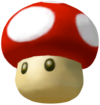
|
Mushroom | A Mushroom gives the kart a brief boost of speed. If used properly, it can be used to take shortcuts and to steal (or drop) items from another kart. |
| File:Tripletsshrooms.jpg | Triple Mushrooms | A bunch of three Mushrooms that give the drivers three boosts of speed. If characters who hold the Mushrooms get hit by an item, some of the Mushrooms fall get dropped and they end up with only one Mushroom left. As with all triple items, some characters hold the Triple Mushrooms, while other characters juggle it. |

|
Banana | When placed, a Banana peel stays on the track until a kart touches it, causing it to spin out. Bananas can be used as shields to break homing items such as Red Shells; however, they can not be dragged behind the kart like in past games, making this technique harder to execute than before. It can either be thrown forward or dropped backward. |
| File:Mkdd fake item box.jpg | Fake Item Box | A fake Item Box that is red with an inverted ? symbol. When used, it stays on the track until a kart hits it and causes that kart to flip. The only way to get rid of these blocks is to run into it, so it can not be used to block homing items. Otherwise, this item eventually vanishes. |

|
Star | When applied, the kart that used it becomes invincible against any item. It also boosts the speed and handling of the kart, and negates the effect of terrain that would otherwise slow the cart, for example, the shallow water on the Peach Beach track. The kart is also capable of knocking out any rival kart and stealing their items just by driving into them. |
| File:Thunderbolt - Mario Kart Wii.png | Lightning | When used, Lightning shrinks, slows, and removes the items of all rival karts. If shrunken, drivers hit by an item while holding an item will drop said item. |
Special Items
- Main article: Special Item (Mario Kart: Double Dash!!)
| Image | Name | Characters | Description |
|---|---|---|---|
| File:MarioFireInDD.jpgFile:Fireball.jpg | Fireballs | Mario & Luigi | A set of five red (Mario) or green (Luigi) Fireballs capable of ricocheting off walls. When they hit another kart, the kart will spin out and slow down. They can be thrown either forwards or backwards. |
| File:Normal heart.jpg | Hearts | Peach & Daisy | A pair of hearts that will surround the kart, absorbing the impact of any item that collides with the kart except for Chain Chomps, Spiny Shells, Stars and Lightning. If used correctly, racers can absorb the item dropped on the road and use it against the other players; this includes most other Special Items. The Hearts have no time limit for use, though since there are only two Hearts only two items can be absorbed. If both characters are holding items when the Heart absorbs an item, the item will disappear. |
| File:Egg.PNGFile:MKDD BirdoEgg.jpg | Yoshi Egg / Birdo Egg | Yoshi & Birdo | A green (Yoshi) or pink (Birdo) egg. They work similarly to a Red Shell, chasing after a kart and knocking it out when collision occurs. After colliding, these eggs randomly let out three items that could be a Banana, Green Shell, Mushroom, Star, or Bob-omb. However, if an Egg takes too long to find a kart, the Egg will break apart but still let out three items. |
| File:Chomp.PNG | Chain Chomp | Baby Mario & Baby Luigi | A huge Chain Chomp is summoned and boosts the kart's speed frantically for a certain period of time, while the Chain Chomp knocks out other karts and drops their items onto the ground. After use, the Chain Chomp leaves the kart and goes following the path until it disappears. It has the same use as a Bullet Bill does in other Mario Kart games, except the Chain Chomp can be disconnected from the kart if the kart gets hit by any item. |
| File:Triplegreenshell.jpgFile:Tripleredshell.jpg | Triple Shells | Koopa Troopa & Paratroopa | An arsenal of three shells, either Green or Red, that can be used to knock other karts. If the character gets hit by another item while holding the Triple Shells, the character will lose all but one shell. Both characters can get either color of shells, depending on their current ranking. |
| File:Mkdd giant banana.jpg | Giant Banana | Donkey Kong & Diddy Kong | Giant Bananas can be littered either forward or backward, staying on the road until a kart collides with it. Drivers will lose control, while the Giant Banana splits into three normal Bananas scattered into a triangle in that area. |
| File:Mkdd bowsers shell.jpg | Bowser's Shell | Bowser & Bowser Jr. | A humongous shell shaped like Bowser's shell that acts like a Green Shell, going in a straight line, and bouncing around the track, destroying items and knocking over other karts, dropping their items onto the ground. It can be thrown forwards or backwards. Bowser's Shell tends to bounce from other special items, including Giant Bananas (though the Giant Banana gets destroyed in the process). |
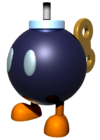
|
Bob-omb | Wario & Waluigi | When used, a Bob-omb stays on the road until a kart passes near it in order to explode and blow up any kart around. If no kart is around the Bob-omb explodes after a few seconds. It can be thrown forward or tossed backward. |
| File:Golden mushroom.PNG | Golden Mushroom | Toad & Toadette | Gold Mushrooms provide the drivers multiple boosts of speed in a row in a period of time. However, it seems to have a time limit; once the first boost is used, the subsequent boosts need to be used before the item disappears. |
- Petey Piranha and King Boo have the ability to obtain any special item, excluding Luigi's Green Fireballs and the Birdo Egg.
- Note: Although special items can only be obtained by the characters they are assigned to, if a player is holding a special item, another player can steal it by colliding with the player holding the item while under the influence of a Mushroom, Star, or Slide-Attack. Also, any character can get any special item in Battle Mode. Finally, in Co-Op Mode, the driver can pass a special item to the person in the back.
Driving techniques
Drifting and mini turbo
- Main article: Drift
Drifting prevents racers from losing speed in turns or from going off the course. By keeping pressed the controller's ![]() button (or
button (or ![]() button), and tilting the stick to sides, racers make the kart turn around. While drifting, racers can gain a momentary speed boost by tilting the control stick to the sides, opposite to a corner's direction. The kart then produce sparks on its wheels. Doing this two times more, racers make the sparks become orange, then blue, and then releasing a mini turbo right after the racer lets go of the
button), and tilting the stick to sides, racers make the kart turn around. While drifting, racers can gain a momentary speed boost by tilting the control stick to the sides, opposite to a corner's direction. The kart then produce sparks on its wheels. Doing this two times more, racers make the sparks become orange, then blue, and then releasing a mini turbo right after the racer lets go of the ![]() (or
(or ![]() ) button.
) button.
This tactic can be used to perform the snaking (continuous power sliding) and elude homing hazards such as Red Shells.
Rocket Start
- Main article: Rocket Start
A Rocket Start is a speed boost given to a kart when a race starts out. To perform, racers just have to press the ![]() button to accelerate right when Lakitu's lights turn green or by tapping the button repeatedly while Lakitu counts down.
button to accelerate right when Lakitu's lights turn green or by tapping the button repeatedly while Lakitu counts down.
Double Dash
- Main article: Rocket Start § Double Dash
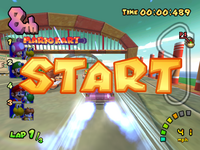
The Double Dash is similar to the Rocket Start. Although it is more powerful, it can only be performed in Co-op play. Both team members can press the ![]() button at the same time when Lakitu's light turns green. Upon being done perfectly, the kart bolts farther, leaving out a blue flame as a result. This technique is named after the game's subtitle.
button at the same time when Lakitu's light turns green. Upon being done perfectly, the kart bolts farther, leaving out a blue flame as a result. This technique is named after the game's subtitle.
Item steal
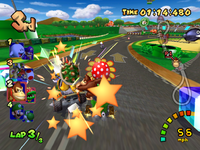
Item stealing is snatching a power-up directly from the rival's hands in a kart. There are three ways to steal an item as long as the player's rear character holds no items. Items can be stolen when the rear racer uses a mushroom or a star to hit an opposing kart and snatch the item that one of the rivals have. In Co-op Mode, the player's rear character can use the Slide-Attack to knock other rivals and take their items away. However, if the rear character knocks a rival kart with two players holding an item, the character can get the rival rear character's item, while the rival driver drops the other item onto the track.
LAN Mode
Using the Nintendo GameCube Broadband Adapter (sold separately) attached to the game system, in Mario Kart: Double Dash!! it is possible to play via Local Area Network (LAN), using up to eight Nintendo GameCube systems connected to a hub device, or also using two consoles connected together through a cross-cable, where more than four players can join a race locally. This means that up to sixteen users can play at the same time with their friends using two or more GameCube systems with the Mario Kart: Double Dash!! game discs on.
After connecting the systems to the hub, the players should turn the systems' power button to begin. The LAN Mode option appears on screen to confirm the selection. Once LAN Mode is selected and confirmed on all participating game systems and the connections have been established, the Select Mode displays. Players may proceed by pressing controller's ![]() button, the LAN Mode title screen displays to enter to play.
button, the LAN Mode title screen displays to enter to play.
In the LAN Mode title screen there are three options:
- Start Game: Begin Versus LAN play.
- Select Mode: Adjust LAN setup options. This allows to the users to choose the modes of play:
- Game Mode: Select one of these game modes available: Versus, Balloon Battle, Shine Thief, or Bob-omb Blast. Only in Versus mode the number of laps on the tracks and the engine classes can be changed.
- Order of Courses: Choose the way in which courses or stages will be selected: Random, All courses, one course or All-cups (only for Versus)
- Co-op: Enable or Disable Cooperative Mode
- Screen Division: This option won't be available if there is more than four Nintendo GameCube systems in use.
- Quit LAN Mode: Stop playing LAN Mode
Unlike the local multiplayer, the players' characters are chosen at random, each time a race begins.
Toad and Toadette can be selected, providing they have been unlocked on one of the memory cards. Petey Piranha and King Boo however are never picked, even if they have been unlocked on one of the memory cards.
The karts that are picked is the one that belongs to the driver. If their respected kart has not been unlocked on one of the memory cards, then they use their respective partner's kart (eg Luigi uses Mario's kart). The exception is that if a small character is paired with a large character then the large kart is used instead. This means the Piranha Pipes, Boo Pipes and Parade Kart can not be used in LAN mode.
LAN connection
In this way, two to eight Nintendo GameCube systems are connected to an over-the-counter 10BASE-T hub. The LAN cables used to connect every game system to the hub must be compatible, otherwise, the connection won't be carried out. Every Nintendo GameCube system has to have attached their Nintendo Broadband Adapter, and the Mario Kart: Double Dash!! game disc in hand, one per system. At last, the number of GameCube controllers used depends on the number of players present.
Cross-cable connection
Unlike LAN connection, where it uses a hub to connect GameCube systems to it, the Cross-cable connection requires of only two GameCube game systems connected between themselves, through a 10BASE-T hub-compatible cross-cable. The rest of the required equipment is similar: A Mario Kart: Double Dash!! game disc per system, the Nintendo Broadband Adapter attached to the game system, and the number of GameCube controllers regarding how many players participate.
Troubleshooting
| Occasionally the users may experience malfunctions or be unable to connect by technical problems. |
|
Differences in multiplayer races
There are several differences that players can notice in split-screen mode, most likely to preserve the frame rate.
All courses
- Item Boxes have a brighter checkerboard texture, as opposed to clearer checkerboard texture.
- Boost Pads look slightly different.
Peach Beach
- The Daisy Cruiser in the background is absent.
- The Piantas are absent.
- Before the finish line, the Pianta statue fountain is replaced by a Power Star.
Baby Park
- The Yoshi helicopter is removed.
Dry Dry Desert
- In the area with two large sandy hills and three small sandy hills, the Item Boxes are removed from the small hills.
- Some of the Pokeys are missing.
Mushroom Bridge
- There are no whirlpools in the water.
- Princess Peach's Castle doesn't appear in the background.
- The Wiggler Bus at Mushroom Bridge is only five body segments long, as opposed to being ten body segments long.
Mario Circuit
- There are fewer Goombas and Piranha Plants at Mario Circuit.
Daisy Cruiser
- The umbrellas are absent.
- The Piantas are absent.
- Areas formerly blocked off by cones are instead blocked off by slightly raised walls.
- The moving Item Boxes do not move, and can spawn Double Item Boxes.
- The colorful banners above the curved staircase are removed.
- There are no shadows at Daisy Cruiser.
- The inside of the ship has no lights on the ceiling.
- There are less Item Boxes in the dining area.
- In the dining area, the tables that aren't used as obstacles are absent.
- In the dining area, the items on top of the pillars were removed.
- There is no trapdoor over the entrance to the shortcut area.
- At the shortcut area, the colored pipes are removed. Additionally, in that same area, the large fan isn't in the tube, despite the fact that players can still get fired out.
- Near the end, there are no life rings.
Waluigi Stadium
- The rings of fireballs on the ramps are absent.
- The metal Piranha Plants do not move their jaws.
- The moving arrow signs are absent.
- The Jumbotron is absent.
Sherbet Land
- There are only two moving Item Boxes at each end of the tunnel, as opposed to three.
- Only two Blue Shy Guys appear before the tunnel as opposed to three.
Mushroom City
- The traffic lights are absent.
Yoshi Circuit
- The Piranha Plants on the first turn are missing.
- The Sunshine, the Daisy Cruiser, and the Yoshi Helicopter do not appear.
DK Mountain
- Boulders are less common.
- At the cliff area, one of the Item Boxes is absent.
Wario Colosseum
- The rings of fireballs on the ramps are absent.
- In the area with five Item Boxes in a row, one of them is removed.
Dino Dino Jungle
- In the area where there are Item Boxes on the trunks, the Item Boxes are removed.
- In the area between the dinosaur's feet, there are only two Item boxes, as opposed to being four.
- There are fewer dinosaurs.
- In the alternate route area, there is only one Double Item Box instead of two.
- Near the end, before the finish line, there are only two moving Item Boxes instead of four.
- The crystals and pillar formations in the tunnels are removed.
Bowser's Castle
- Four of the six Thwomps are absent.
- The Lava Bubbles are removed.
- In the circular room, three of the six rotating fireballs are removed.
- The Bowser statue shoots fireballs at a slower rate.
Rainbow Road
- At the second sharp turn area, one of the Item Boxes is removed.
- The buildings below are absent.
- All the floating items are removed.
Media
- For a complete list of media for this subject, see List of Mario Kart: Double Dash!! media.
Pre-release and unused content
The models of the characters are from Super Smash Bros. Melee, and Mario and Luigi are seen in this trailer of a very early build of the game, driving separately, each in a simple, blue kart.
Reception
The game received favorable reviews, getting an average score of 87.20% in GameRankings based off 73 reviews and an average score of 87 based off 68 reviews in Metacritic.[9][10]
Spencer McIlvaine of Nintendo Life gave the game 9 stars out of 10, praising the game as being a worthy successor to the Mario Kart franchise, despite that it has less innovation than the other games. He concluded with "Nevertheless, the game has lost some of the edge that it had in its first two outings and shows fewer innovative ideas here. This time around the game was mostly about better graphics and less buggy programming with a few gimmicks thrown in like having two drivers instead of one. As a result, Double Dash is not the most recommended Mario Kart game in the franchise. But compared to other games in general it’s still one heck of a ride."[11] Tom Bramwell of Eurogamer gave the game a score of 9 out of 10. He praised the game for adding more content, especially the online LAN mode. He wrote, "In my opinion, it's not a better game than the original Super Mario Kart, but it is the closest anyone's ever come, and one of the finest pieces of electronic entertainment ever developed." He also stated that rating Mario Kart Double Dash!! was the hardest thing he did because he always wanted to write about it.[12]
On the contrast, Edge Magazine UK gave the game a 5 out of 10, criticizing the game of "not being a racing game any more".[13] Fran Mirabella III of IGN gave the game a score of 7.9 out of 10. He criticized that Mario Kart Double Dash!! felt very similar to Mario Kart 64 and although it gets the job done that it felt that it had wasted potential. He praised the multiplayer for being superb.[14]
Mario Kart: Double Dash is the 2nd best-selling game for the Nintendo GameCube, right behind Super Smash Bros Melee, with approximately 7 million copies sold, including 3.8 million copies in the United States[15], and over 802,000 units in Japan, as of December 31, 2009.[16]
Glitches
- Main article: List of Mario Kart: Double Dash!! glitches
Permanent upside-down car
This glitch only works with the Parade Kart. The player should go to a place where they can get smashed by the course obstacle, such as the Thwomps in Bowser's Castle or the blue dinosaur in Dino Dino Jungle (Bowser's Castle is preferred because the Thwomps are stationary). This glitch best works for two players, as timing is needed. One player should drive underneath a Thwomp, while the other should receive an explosive power-up, either a Spiny Shell or a Bob-omb. When received, the player should fire the item at the correct moment, blasting the kart into the air and getting smashed under the floating Thwomp. After falling down, if done correctly, the player will remain such, which is upside down. Note that the player is invincible in this position and the player can only revert to normal position if Lightning strikes them and a Thwomp afterward.
Staff
- Main article: List of Mario Kart: Double Dash!! staff
Executive producer
Producers
- Shigeru Miyamoto
- Tadashi Sugiya
- Shinya Takahash
- Takashi Tezuka
Chief director
- Kiyoshi Mizuki
Directors
- Yasuyuki Oyagi
- Futoshi Shirai
- Daiji Imai
Assistant director
- Kentaro Tominaga
Gallery
- For this subject's image gallery, see Gallery:Mario Kart: Double Dash!!
- MKDD06.png
Mario and Bowser on the Koopa King
Key artwork showing default teams on Yoshi Circuit.
- 4player DD.jpg
A Versus race on Sherbet Land
References to other games
- Super Mario Bros.: The music for "Tilt-a-Kart" starts out with the famous ground theme, and it features Mario's 8-bit sprite from this game.
- Yoshi's Cookie: In the battle stage Cookie Land, cookies are seen from this game in the background. The level itself is also based off this game.
- Super Mario Kart: The logo of this game can be seen in Mushroom City.
- Mario Kart 64: The name "Sherbet Land" is taken from this game. Also, Waluigi Stadium resembles Wario Stadium. Also the horn used on the Bloom Coach is the same horn used by the white cars from Toad's Turnpike. Also, the Heart Coach, Bloom Coach, Piranha Pipes, and Boo Pipes share an engine sound similar to Peach's and Yoshi's karts from Mario Kart 64. The music for Rainbow Road contains a segment of Mario Kart 64's Rainbow Road music.
- Super Smash Bros.: Mario's Red Fireballs and Luigi's Green Fireballs were reused as Mario and Luigi's special items in this game.
- Donkey Kong 64: Diddy Kong's voice clips are recycled from this game.
- Luigi's Mansion: The battle course Luigi's Mansion is based on this game. King Boo returns from this game.
- Wario Land 4: The Wario Car is taken from this game.
- Super Mario Sunshine: Peach Beach is heavily influenced by Gelato Beach. Shine Sprites appear on many billboards in the courses, as well as Shine Thief. Piantas and Nokis appear in Peach Beach as well as the Award Ceremony. The tracks have similar connections as some tracks can be seen in other tracks (e.g. DK Mountain can be seen at Baby Park). Also, in Yoshi Circuit, the Shadow Mario "M" sign appears on the first sign in the course, near the first turn. Additionally, Petey Piranha appears as an unlockable playable character.
- Mario Golf: Toadstool Tour: Bowser and Bowser Jr.'s voice clips, the countdown sound effect from Speed Golf, and the artwork for the Chain Chomp item are recycled from this game.
References in later games
- Later Mario Kart games: Mario Kart: Double Dash!! is known to have set the standards for later games in many ways. The 3-second countdown, which was introduced in this game, was reused in all later Mario Kart games. This is also the first game to have its final lap music one key note higher. This also marks the first time the player loses an item after falling off the course or being hit by certain items or obstacles. The Bob-omb item that was introduced as a Special Item for Wario and Waluigi in this game became a regular item in later games. The Chain Chomp item for Baby Mario and Baby Luigi was re-worked into the Bullet Bill item.
- Mario Power Tennis: The item boxes are identical to the ones in this game, and so are the items themselves and the item boxes' sound effects. Toadette makes a cameo appearance during the game's opening cutscene. The 3-second countdown sound effect is used when a round of Artist On the Court is about to begin.
- Super Mario 64 DS: Some of Mario's, Luigi's, and Wario's voice clips were reused for this game.
- Dance Dance Revolution: Mario Mix: The songs Rollercoasting and Bowser's Castle are remixes of songs from Luigi Circuit, Mario Circuit, Yoshi Circuit and Bowser's Castle.
- Mario Superstar Baseball: Some of the voices are reused from this game. Also, Mario's Red Fireballs and Luigi's Green Fireballs were used as their special shots.
- Mario Kart DS: The character profile sprites of characters that re-appeared in this game were reused, although mirrored. Also, Luigi Circuit, Baby Park, Mushroom Bridge, Yoshi Circuit, and the battle course Pipe Plaza reappear in this game and some of the voices are reused from this game and the Toad Kart resembles the Standard Kart.
- Mario & Luigi: Partners in Time: Some of the voices are reused in this game.
- Mario Hoops 3 on 3: Some of the voices are reused from this game.
- Mario Kart Wii: The standing character models and animation in the character select screen of characters that re-appear in this game are shown again here, except a few characters. Also, Peach Beach, Mario Circuit, Waluigi Stadium, DK Mountain, and the battle course Cookie Land reappear in this game. The Grand Prix starting jingle is recycled to this game for both the Grand Prix and VS Race.
- Mario Kart 7: Daisy Cruiser and Dino Dino Jungle reappear in this game, and a modified version of the Barrel Train is an unlockable kart frame. A section of the music for this game's Bowser's Castle covers the main theme of Bowser's Castle. Also, some of the voice clips are reused.
- Mario Party 9: The song "Pandemonium" is a cover version of the battle theme (played in Fungi Frenzy, Hazard Hold and Flinger Painting). Also, some of the voice clips are recycled from this game.
- Mario & Sonic games: Daisy's voice clip from the selection screen is reused from this game. In the first game in the series, the Star theme is reused when the player gets a star in Dream Race. Mushroom Bridge reappears in Mario and Sonic at the Sochi 2014 Olympic Winter Games.
- Super Smash Bros. Brawl and Super Smash Bros. for Nintendo 3DS / Wii U: The music for Rainbow Road appears in the stage Mario Circuit, and several Stickers and Trophies reference Mario Kart: Double Dash!! as well.
- Mario Kart Arcade GP DX: The Fusion Kart mechanic is most likely inspired by the two-person kart feature of this game. Voice clips that were recorded in this game are also reused for Mario Kart Arcade GP DX.
- Mario Golf: World Tour: Some voice clips for Diddy Kong were reused.
- Mario Kart 8: Characters physically hold items. Dry Dry Desert and Sherbet Land return as retro courses, while Yoshi Circuit and Baby Park return as DLC.
- Mario Kart 8 Deluxe: Double Item Boxes and the Bob-omb Blast and Shine Thief battle sub-modes return. Luigi's Mansion reappears as a retro battle course.
Names in other languages
| Language | Name | Meaning | Notes |
|---|---|---|---|
| German | Mario Kart: Double Dash!![?] | - | |
| Italian | Mario Kart: Double Dash!![?] | - | |
| Spanish | Mario Kart: Double Dash!![?] | - |
Trivia
- This is the last main Mario Kart game to use the original series logo for its box art and tracks. The next installment would introduce the new and current logo.
- On the box art for the European and American releases, the "L" on Luigi's cap is backwards.
- This is the first game in the series that can be played in multiple languages beside English and Japanese.
References
- ^ a b A transcription of the actual stats of the vehicles used in the game.
- ^ a b c d e Observations on how to read the transcribed in-game data.
- ^ Mister Wu's raw Mario Kart data (November 22, 2015). MKDD - A more thorough acceleration test. Youtube. Retrieved January 11, 2016.
- ^ Mister Wu's raw Mario Kart data (February 1, 2016). MKDD - The second acceleration parameter. Youtube. Retrieved May 9, 2016.
- ^ Mister Wu's raw Mario Kart data (December 8, 2015). MKDD - acceleration while drifting test. Youtube. Retrieved March 23, 2016.
- ^ Mister Wu's raw Mario Kart data (February 1, 2016). MKDD - The acceleration determined by the acceleration parameters is relative. Youtube. Retrieved May 9,2016.
- ^ Thomas Beumann (April 2012). MKDD for Noobs - Techniques. Retrieved November 2, 2015.
- ^ [1]
- ^ http://www.gamerankings.com/gamecube/516710-mario-kart-double-dash/index.html
- ^ http://www.metacritic.com/game/gamecube/mario-kart-double-dash!!
- ^ http://www.nintendolife.com/reviews/2009/05/mario_kart_double_dash_retro
- ^ http://www.eurogamer.net/articles/r_mariokartdd_gc
- ^ Edge, page 98
- ^ http://www.ign.com/articles/2003/11/11/mario-kart-double-dash-2
- ^ http://web.archive.org/web/20070106203333/www.the-magicbox.com/Chart-USPlatinum.shtml
- ^ http://web.archive.org/web/20050225220704/www5e.biglobe.ne.jp/~hokora/gcrank.html

